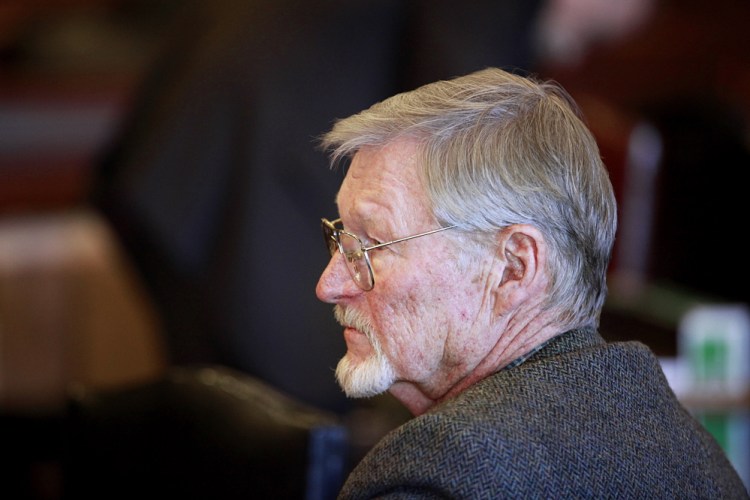The state police sergeant who was the first officer to arrive at the scene of a fatal shooting at a North Yarmouth bee farm in 2013 said he could “smell the odor of liquor” on the man holding the gun.
Michael Edes, who has since retired, testified Wednesday during the third day of the murder trial of 72-year-old Merrill “Mike” Kimball in the Cumberland County Courthouse in Portland. Edes said that although Kimball had apparently been drinking, the Yarmouth resident did not seem impaired, other than failing to immediately respond when Edes commanded him to put his hands up and get on the ground.
“He was just staring at me when I was looking at him, and it was one of those mile-long stares,” said Edes, who got to Brown’s Bee Farm on Greely Road quickly because he lives only two miles away.
Edes said the shooting scene was “hot and active” when he arrived. The shooting victim, 63-year-old Leon Kelley of Georgetown, was still alive and lying on the gravel driveway of the bee farm sales shop. Kimball had a handgun holstered at his waist, and moved his hand toward it twice. Members of the Kelley and Kimball families were gathered around.
“I was really feeling threatened because (Kimball’s) hand was near his gun, and I was worried about the safety of those in the area,” Edes said. “We were just a few seconds away from me having to use a more aggressive move.”
Edes said he couldn’t tell why Kimball wasn’t responding to his commands, whether he was in shock or whether alcohol was a factor.
Kimball, who has maintained he acted in self-defense after Kelley assaulted him, was never arrested in the case and was not tested by police to determine whether he was intoxicated, his attorney, Daniel Lilley, has said. Kimball has remained free on bail since being indicted on a single count of murder in Kelley’s death.
Kelley’s stepson, Craig Rawnsley, testified Wednesday that Kelley wouldn’t have “escalated the situation” by pushing Kimball if he had known Kimball was armed with a concealed pistol.
Rawnsley described to the jury a confrontation between his family and Kimball’s family that led to the shooting on Oct. 6, 2013.
He pointed to a map to show where he, Kelley, his sister and mother stood on one side facing Kimball, with Kimball’s wife, Karen Thurlow-Kimball, and her son, Damon Carroll, on the other side in front of the sales shop.
Rawnsley, who is 6 feet 2 inches tall and weighs 205 pounds, said he put his hand on Carroll’s shoulder to stop him from moving. Kelley, who was 6 feet 4 inches tall and weighed 285 pounds, put his hands on Kimball’s shoulders in the driveway, spun the smaller man around and pushed him toward the road, Rawnsley said.
Rawnsley initially testified that Kelley hadn’t escalated the situation to start a fight, but reversed his testimony under cross-examination after Lilley played a video of Rawnsley’s statement to police taken the day of the shooting.
“Damon (Carroll), he is not as big as me, and obviously Merrill (Kimball) was not as big as Leon (Kelley),” Rawnsley told Maine State Police Detective Ethel Ross in the video. “He was a scared 70-year-old man, and his only resort was the weapon.”
Kelley and Kimball had never met before that day, but the shooting followed a bitter, ongoing rift between the families of the two men over the bee business built by Stan Brown, a 95-year-old master beekeeper well-known in the state’s small beekeeping community.
Kimball’s wife, Thurlow-Kimball, managed the farm and sold the honey. The two families had been at odds ever since Brown included Thurlow-Kimball in his will, leaving the bee business to her, along with four acres of his 10-acre property.
Brown’s daughters – including Kelley’s wife – and other members of the family were concerned that Thurlow-Kimball was taking advantage of their father as his memory began to fade.
Kimball, who is licensed to carry a concealed weapon, contends he was justified in using deadly force when he fired three shots from his Ruger .380 into Kelley’s torso after Kelley assaulted him, and after other members of Kelley’s family assaulted Kimball’s wife and her son.
The exchanges between Lilley and Rawnsley as he testified Wednesday became testy at times. As Rawnsley described Kimball as the aggressor in the fight, Lilley confronted him with his statements to police in which Rawnsley had depicted Kelley as the aggressor.
“That night was a tremendously difficult night,” Rawnsley said, explaining the discrepancies between his statements to police immediately after his stepfather’s death and his testimony Wednesday.
He said that after Kimball fired his gun, Kelley dropped to the gravel driveway and Kimball then aimed the gun at Rawnsley, who was at his side.
Rawnsley, who works as a Portland firefighter, said Kimball still had the gun drawn when Rawnsley pulled out his cellphone to call his brother, Daryl Rawnsley, deputy chief of the Cumberland Fire Department, to come help treat their stepfather’s wounds.
Rawnsley described how he and his brother, who arrived within minutes, helped load their stepfather in the ambulance and rode with him, trying to treat him on the way to Maine Medical Center in Portland.
Daryl Rawnsley also testified Wednesday, saying that his stepfather died about 10 minutes after arriving at the hospital.
The trial is expected to continue into next week. Numerous police officers are scheduled to testify Thursday, according to the prosecution.
Kimball faces 25 years to life in prison if convicted of murder. If convicted of manslaughter, he faces up to 30 years in prison. Kimball rejected a plea offer before the start of the trial. The terms of the offer have not been disclosed.
Send questions/comments to the editors.



